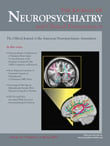Mania as a Possible Prodrome to Dementia
SIR : There has been much debate over whether late onset depression may be a prodrome to dementia. 1 Kessing and Fleming 2 have also suggested a link between affective disorders and dementia. The authors could not find a report in the literature that described mania preceding the diagnosis of dementia. Below we describe an elderly patient who was diagnosed with dementia following a solitary episode of mania.
Case Report
“Mr. V” is a 76-year-old Caucasian man who presented to our facility with an isolated manic episode prior to obtaining a definitive diagnosis of dementia. Besides a self-limited episode of depression that occurred in his thirties, he had no other notable past psychiatric history. The patient was reported to be euthymic and relatively cognitively intact until he underwent the removal of a basal cell carcinoma for which he received a 2 to 3 week course of corticosteroids. Approximately 6 weeks following the discontinuation of the corticosteroids, Mr. V exhibited symptoms of mania, which included insomnia, hyperreligiosity, hypersexuality, hyperverbosity, irritability, and increased cleaning behavior which led to his first psychiatric hospital admission. Upon admission to the hospital, Mr. V’s Mini-Mental State Examination (MMSE) was 21/30. He was treated with a vast array of mood stabilizers and his mania eventually abated 2 months into his hospital stay. Following the aforementioned manic episode, the patient then became apathetic while in a euthymic state. He would sleep the majority of the day and night and express no desire to participate in activities. His apathy was mood congruent and there was no indication of any affective disturbance. The patient would also frequently confabulate his activities and experiences. Neuropsychological testing revealed impairments in verbal and visual learning and memory, executive functioning, and complex aural comprehension. Object naming and word finding tasks were preserved, suggesting a diagnosis of Alzheimer’s dementia. His MMSE at this time was 23/30. A full medical work-up was also conducted and revealed no vitamin deficiencies, thyroid dysfunction, or source of infection. His EEG was normal and a magnetic resonance image of his brain revealed small vessel ischemic changes. Furthermore, a single photon emission computed tomography scan revealed hypoperfusion of both frontal lobes and mild bilateral temporal lobe perfusion; both of which were deemed nondiagnostic findings.
Comment
The presentation of the above patient suggests that affective disorders in general may precede the diagnosis of dementia. Such a prodrome may not be confined to depression and may, in fact, include mania.
1. Scheitzer I, Tuckwell V, O’Brien J, et al: Is late onset depression a prodrome to dementia? Int J Geriatr Psychiatry 2002; 17:997–1005Google Scholar
2. Kessing LV, Flemming MN: Increased risk of developing dementia in patients with major affective disorders compared to patients with other medical illnesses. J Affect Disord 2003; 73:261–269Google Scholar



